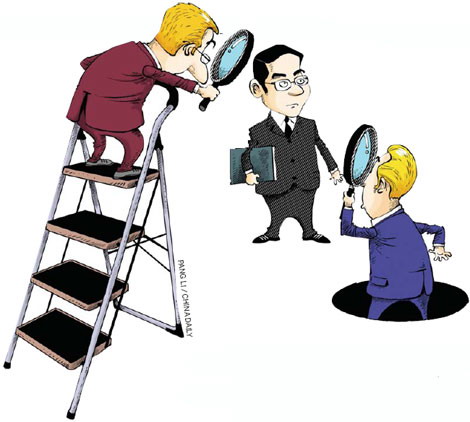Op-Ed Contributors
China has a long way to go
Updated: 2010-12-10 13:21
By Liu Shengjun (China Daily European Weekly)

'Less innovative' approach is rooted in complicated historical and cultural background
Traditionally, China has been labeled as a country good at imitation and manufacturing, rather than technology. That is partly true: If you look at the top 100 brands in the world, none are from China.
There are some exceptions, however. Huawei, for instance, has grown into the No 2 telecom equipment supplier in the world. Among its 95,000 staff, 46 percent are R&D people. BYD, a leader in producing new-energy cars, has attracted significant investment from Warren Buffett, the famed US investor. Some other companies are trying to buy technology and brands in developed countries, whose examples include Lenovo's acquisition of IBM's PC business, Geely's acquisition of Volvo, and TCL's acquisition of Thomson's TV business.
However, in the foreseeable future, the high-tech industry will continue to be dominated by US and European firms; and Chinese companies' high-tech ambitions will be hindered by many factors.
First, the Confucius tradition is not encouraging of innovation. China's traditionally "less innovative" approach to both life and work is a habit rooted in the nation's complicated historical and cultural background. Within the Confucian value system, the utterances of ancestors and sages were worshipped as infallible, and it was widely believed that "the ancestral tradition should never be altered". This stifled the natural curiosity and innovative thinking of generations of Chinese. When faced with new problems, they were accustomed to looking for answers by re-reading the classics.
Another contributing factor to this lack of originality lies in the traditional Chinese rejection of natural science. The easily satisfied Chinese curiosity - the tendency to accept partially met requirements contrary to the scientific approach that features exactness. This issue is known as Needham's Puzzle, named after the famous British historian Joseph Needham.
In addition, the Chinese education system poses another problem. For many years, educators have relied heavily on standardized tests that favor those with excellent memory while neglecting the cultivation of creativity and communication skills. Under this system, learning by rote is encouraged, and cramming for courses is widely popular. All these factors combine to create obstacles to students' ability to think creatively.
Another feature is that China's current system discourages creativity. In a market economy, a rational thinker maximizes profit. It comes as no surprise that entrepreneurs tend to seek the easiest available way to make a profit. Innovation, which is usually more challenging, is often avoided. For example, many Chinese companies' "real estate mania" is not a product of their zeal for innovation, but has arisen out of their craving for high returns. The actual operation of a real estate project requires almost no innovation- as long as a company can grab a plot of land through its "connections", huge profits are guaranteed.
China's local governments possess considerable resources and power, which spawns corruption if insufficiently supervised. When corruption brings higher returns than the true marketplace, businesspeople may feel they have no choice but to bend the rules. Given the rules of the game, it is inevitable that we see one government official after another implicated for abusing powerful positions that provide access to land administration, highway construction, urban construction, bank loans and IPOs.
Behind them are groups of "entrepreneurs" who have amassed fortunes, thanks to the misdeeds of these officials. A system with so many gray areas and unwritten rules cannot encourage innovation.
The lack of full protection for intellectual property rights (IPRs) in China is another obstacle to creativity. Traditionally, the Chinese only recognize tangible assets and do not have a clear understanding of the often-intangible intellectual property. While IPR piracy may bring Chinese companies high returns in the short term, in the long run, it will stunt their ability to be innovative. The lack of IPR protection is a huge chasm over which Chinese companies must leap before achieving innovation.
The dominance of State-owned enterprises (SOEs) is another factor unfavorable for innovation. Innovation is essentially a form of risk, and innovators in China will never be motivated unless they are rewarded for risk taking. For those responsible for innovation at SOEs, failure brings utter disgrace while success goes unrecognized. This disparity between risk and reward is a clear restraint on innovation.
On a higher level, SOE monopolies in the telecommunications, petrol, finance, and power industries have also created a serious barrier to innovation. On the one hand, they can easily rake in high profits, so where is the incentive to be innovative? On the other, monopolies enjoy unfair advantages while the administrative barriers to market entry shrink the space where innovative small companies can survive. In fact, of the 43 Chinese companies in the 2009 Fortune 500 list, only one- SHA Steel- was a private company.
Obviously, there are plenty of obstacles for China to overcome on the road to developing high-tech industries.
The author is deputy director, China-Europe International Business School (CEIBS) Lujiazui International Finance Research Center and CEIBS Case Development Center.
E-paper

Ear We Go
China and the world set to embrace the merciful, peaceful year of rabbit
Preview of the coming issue
Carrefour finds the going tough in China
Maid to Order
Specials

Mysteries written in blood
Historical records and Caucasian features of locals suggest link with Roman Empire.

Winning Charm
Coastal Yantai banks on little things that matter to grow

New rules to hit property market
The State Council launched a new round of measures to rein in property prices.
